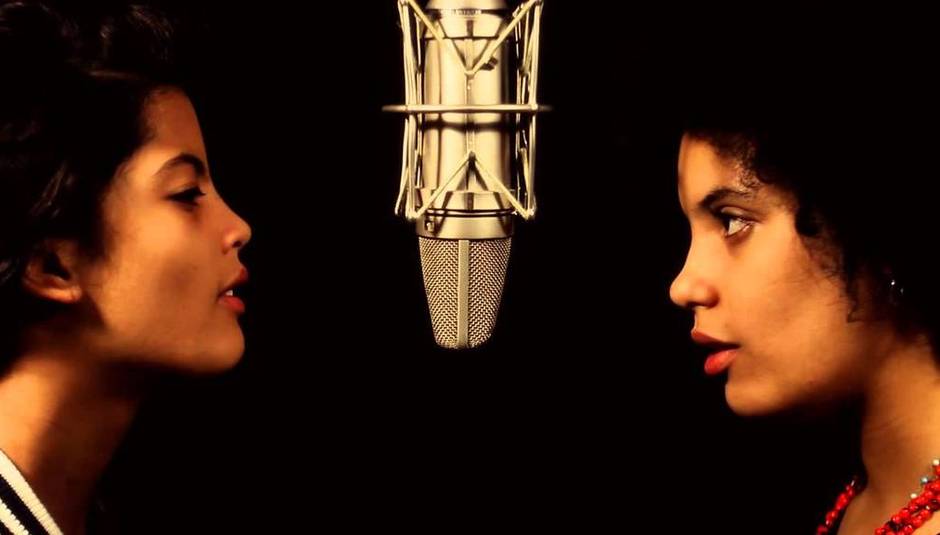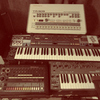“We are twins so we are always arguing. On stage it's just amazing the way we understand each other but rehearsing and all that stuff, it's quite hard, to be true.”
Working with family members can be fraught with difficulties. Naomi Diaz is talking about working with her sister, Lisa-Kaindé Diaz, whom together they make Ibeyi [pronounced ee-bey-ee]. Perhaps it's because they attended separate schools and had their own friendship groups that they seem more individual than most other twins I have met. Not that they've reached Noel/Liam levels of sibling animosity yet (like this delicious quote from Noel: “Liam only has two problems - everything he fucking says and everything he fucking does.” Yikes!)
When I meet the Diaz sisters at their hotel the morning after their sell-out (and stellar!) show at Bush Hall in West London, it soon becomes apparent how different they are. Lisa, the primary songwriter and singer is, by her own admission, the scared one. So scared in fact, she confesses she thought about turning down their record deal with XL (can you imagine any other new artists even thinking about that?) Whilst Naomi, who sings, plays a variety of percussion instruments and produced the album with Richard Russell, describes herself as tough, willing to throw herself head-first into situations. As if to prove this difference, she rolls her eyes whenever her sister talks of her vulnerabilities, though this is more for laughs, which regularly erupt throughout our exchanges.
It is their chemistry on stage which is most palpable. During the show at Bush Hall, they keep a close eye on each other, anticipating the next hit of the cajón, or to pounce in when the leading jazz chord strikes. Most remarkably, and perhaps unsurprisingly, it's the sound of their voices together which really grabs people's attention.
They sing in English and French but it is the acapellas sung in their ancestral Yoruba language which really has the audience eating out of the palms of their hands. Originating in West Africa, specifically Nigeria and Benin, Yoruba culture was uprooted to Cuba via the slave ships, where their father, the late Angá Díaz, the much-celebrated percussionist in Buena Vista Social Club, was born, a descendent of the African-diaspora (nb: Ibeyi also means 'twins' in Yoruban and a number of their song titles make reference to Yoruban orishas (deities) like Eleggua and Oya). Though the twins grew up in France, they took yearly trips to visit their father in Cuba, and joined a Yoruba choir in France at the behest of their mother (a singer in her own right). This cross-continental, cross-cultural upbringing has resulted in a melting pot of Hip-Hop, Latin-Jazz with Pop sensibilities and Yoruban music which forms the beating heart of their eponymous album, which is primed to become one of the most distinctive debuts we'll hear all year.
DiS: Tell me about the experience of making your first album?
Lisa-Kaindé: Magic! Studio time is amazing because you are learning so much and the fact that we were doing it ourselves actually helped us a lot to enjoy it.
Naomi: And Richard Russell is amazing.
L: He is an amazing man. He gave a lot to us and taught us a lot.
N: Which I think is really generous because there are a lot of producers that are like,"I'm doing it myself, you cannot do it. You are too young. I'm doing it for you" etc. and they are not teaching you. They are not helping you to grow. They are not giving you things. Richard was not like that. He was always giving to you, putting an instrument in your hands...
So, really teaching you physically?
L: Well it was not teaching like [sings] "Do Ri Me Fa So La Ti Do". He was not like that...
N: He was like, "Try!"
L: "Come on, a little more like that, you are close", things like that. We were always searching together.
N: There was a lot of communication.
When I was doing my research and obviously your father Angá Díaz came up because he was a famous musician, and I stumbled across a documentary about the making of his only solo album Echu Mingua, and I noticed some of the musical references to him on your album…
L: Yeeeeah!!! [They both start smiling wildly]
...I noticed the strings on 'Think of You' are from his cover of 'Round Midnight' and the first track 'Eleggua' was the name of your father's Yoruban deity, is that correct?
L: Yes!
So he kind of looms large over this record, even though it doesn't sound like his music per se. Was that a deliberate thing?
L: No it was unconscious.
N: We only realised afterwards.
L. We realised, it was unconscious, but kinda the same that we mixed all of our influences and all the music that we felt defines us. And he did the same. He used to mix everything because he used to love every music.
N: He used to put DJs, like DJ Dee Nasty is on his album, African music, Latin jazz...
L: ...Yoruba music, so he used to mix it to. And, of course, he was Yoruba too, so it influenced us. And we are always saying that our mother always influenced us a lot too. She was the one that took us to the Yoruba choir, she was the one next to us when we started playing piano and everything.
Lyrically, a lot of the record is about family and prayer, as you've said before in other interviews, but within that there is a sense of coming to terms with your father's passing and your family's history. Would that be a fair assessment? It's quite hopeful...and overcoming?
L: Yeah! Oh, I'm glad you said that because I think one of the only bad reviewers we had, a man or a woman - I don't remember, said it was a depressing album. 'So much drama...'
N: I was like, oh man, you didn't understand at all.
L: We were like, my god, it's like the opposite. For us, it's about hope, of love, homage. It's about making an homage to the people you like, and it's about saying, 'Yes, there's death in life, you lose people that you love, but you are still living. You are still enjoying and you can remember them without wanting to die.' It's all about that - being them and feeling them - but being alive too.
My favourite track on the album is 'Oya'. I loved the arrangements you made for it last night too. Tell me how you came to write that song?
L: I was with my boyfriend and we split up. It was in the airport and I was going to Cuba and he was going to Barcelona. I was really sad. Like, really really sad. And I kept crying crying crying and she [Naomi] was like 'Stop crying. Please stop crying'. I was like crying for a week...
N: [rolling her eyes] Like, all night and all day...
L: It was really hard. And then one day, I woke up, I was in Cuba, I sat on my chair and started writing with a little African piano (mbira) and I wrote it straight away. And I felt sooooo relieved. It was like all the pain...
N: [singing Mary J Blige] “No more drama in my life...”(laughs) We were saying about no drama and this is a dramatic song!
L: It took the pain away and I felt so relieved. It's weird but I think I needed to write this song. For me, it was a way to make this relationship an immortal thing. So yes, I'm really happy that 'Oya' exists.
Me too. I was wondering whether you were aware of how the album might be received because of it's mix of pop and Yoruba music. Were you aware of how people might react to that?
L: During it? No. A little bit after we were scared because we thought if it's a bit too weird or if people are not putting it on the radio - because it's always a little like that - if you are not on the radio nobody listens to it.
N: But we never did the album to be on the radio.
L: Yes, of course, but the amazing thing about this album is all those questions came afterwards. We were scared, of course you are scared when you are doing something you really like and you think it's you 100%. You are giving it to the world. You are so freakin' scared. You don't how people are going to receive it.
N: But I think we are doing something different so...some people will like it, some people won't like it, so whatever but we are doing something different I think it can be cool..
L: It's really good that we are together because I'm really the scared one
N: [rolling her eyes, deep sigh] Oh my god...
L: ...and I think without her I wouldn't be here actually because I'm so scared I would just be a music teacher because this is also something I wanted to do one day in my life. I would never be on stage alone and carry all of this alone. It's heavy. It's heavy stuff and she's a wire.
N: I'm tough. Sometimes it's cool to not think about things and go. Like Ibeyi - go go go! In life, sometimes like, y'know, thinking too much is bad too, you end up doing nothing. It you think think think think think...
Some of the best decisions I've ever made have been impulsive in retrospect. It's about trusting your instincts, isn't it?
L: And your heart! Because when everything started moving just 8/9months ago they said 'Do you wanna make a record with XL and Richard Russell?' It was like 'Oh god I don't know...' I was panicked. I did the record but I was still at university doing my exams and everything. In the end I had to decide and I was so scared. I didn't know if I wanted to travel all my life, I don't know if I'm strong enough to do it. I don't know if I'm strong enough to play every day because it's a different job to bring this emotion every day. I don't know if I'm strong enough to carry all of this. And I thought about it, and I was like, if you don't do it you're going to regret it all your life. Just do it and try. And if it's not your thing then you will see. You are right, in a way, you have to trust what you want to do in the exact moment and for me it was Ibeyi. So I said, that's it, and I quit the university.
Talking of XL, was that quite a daunting prospect given their successes and because they are so famous?
L: We had no clue!
Ha! You had no idea?
N: We knew of the artists on XL.
L: At our first real show in Paris, in a tiny place called The Sunset which is like a tiny jazz club, our mother said to us XL are coming. We were like, 'Who is it?' They said ,'Do you know this artist and this artist?' And we were like, 'Yeah...'
I can picture it now. 'Have you heard of an artist called Adele?'
L: (laughs) 'Yeah, cool! Do you know them? Yeah, well, they are BIG!' And we met them and I was excited to be in XL because they know how to work with young artists, which I think is really important. They know that you can be young and have something to say. And I think art is all about what you have to say. If you have something to say, you should make art. A lot of people think that when you are young, you just say bullshit. But it's wrong. I mean, babies can say amazing things. I've experienced 4 year old girls saying things that really touched me and actually change my life. XL know that and they sign different people but with their own world, in their own bubbles. We were really excited.
I think you fit very well in that sense. There is no one that sounds like Ibeyi, which is a credit to you both, and in the same way, no one sounds like King Krule, no one sounds like Shamir....
N: No one sounds like him [Shamir]. Ahhh he's so lovely, I love him. He's so sweet. He posted a picture on his Facebook with him and the cajón saying "Hey! I'm Naomi Diaz!" (laughs)
L: I really, really enjoy being next to King Krule. He's an artist and I think he lives for art. He's 100% into it and he writes lyrics like nobody. I love his lyrics.
As soon as the album came out I bought the vinyl and poured over the lyrics. I would love to interview him.
L: He would love to do it! He's really cool. He's in his own bubble so sometimes so he will not show up sometimes but he's really nice and he's so natural. One day he said, “Hey, Kanye asked me to do a duet with him", and I said, “Did you say yes?” And he said no!
N: Who?
L: Kanye West!
N: He said no?
Wow. How come?
L: Because he's like that! He just so natural and he knows what kind of music he wants to do. And if one day he wants to do another person, he will do it, and if he likes the project, he will do it. That's something I like about him. One day I was talking to him about his music and I said I see myself more like a musician or a composer, and I asked how do you see yourself? He said to me, 'I see myself more as a poet.' I was like, yeah, you can really feel that in his music.
What would you like to do next now you've completed your first album?
N: Second, third...We wanna do more and more and more and more and lots of travelling.
L: Lots of feats? How do you say? Not for our album but for other albums...
N: Featurings...
L: I think one of the best things in the world is sharing something with someone. Putting music together, I feel, is so good. It's so amazing to share with a musician that you like and enjoy their company so I hope it will work and then writing for movies I really want to do. I'm obsessed with it. I've never done it. I'm not even sure I can. But I really want to try.
Who would be a dream director or producer you'd like to work with?
Both: [at the same time without skipping a beat] Xavier Dolan.
L: Do you know him?
No I don't.
L: My god! You English people! You have to see it. It's called Mommy. You have to see it. Write it down!
It will be on the tape!
L: Ah, okay.
N: And the guy who did Whiplash, Damien Chazelle.
L: I would love to write music for him and thousands of people. I would like to write for anybody, really. But Xavier Dolan you should really, really see. All his films are amazing and actually he started at 19 and his first movie is a masterpiece. It's called I Killed My Mother. He's an amazing guy, he's really into pop culture, a lot of Celine Dion in his movies. The way he films, and the way he makes movies, and the way he works with the actresses he uses, all these things are amazing.























